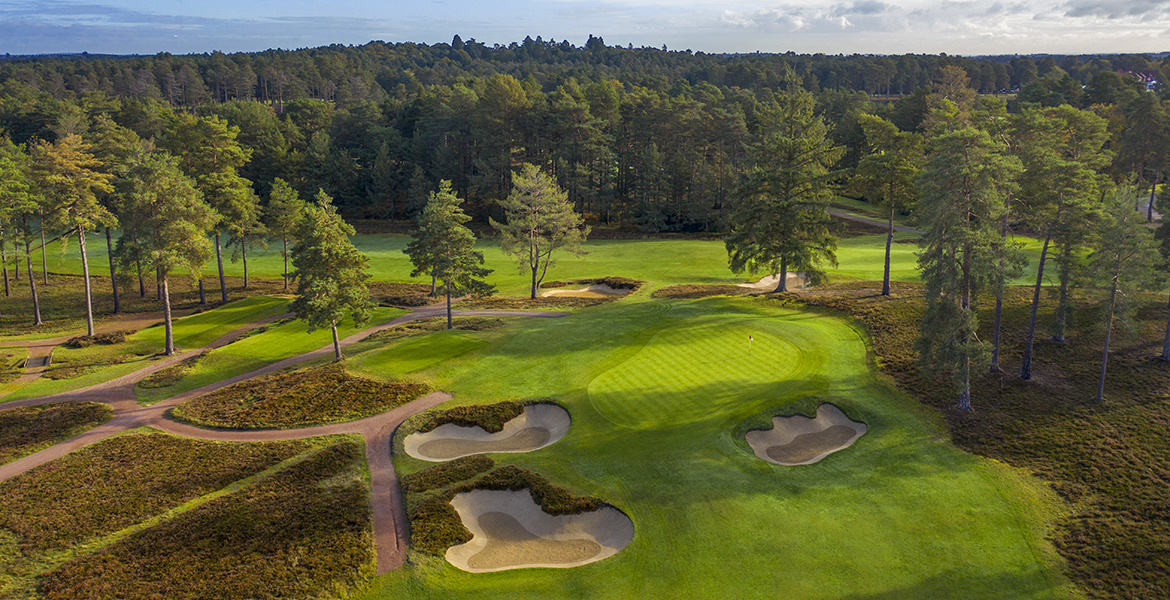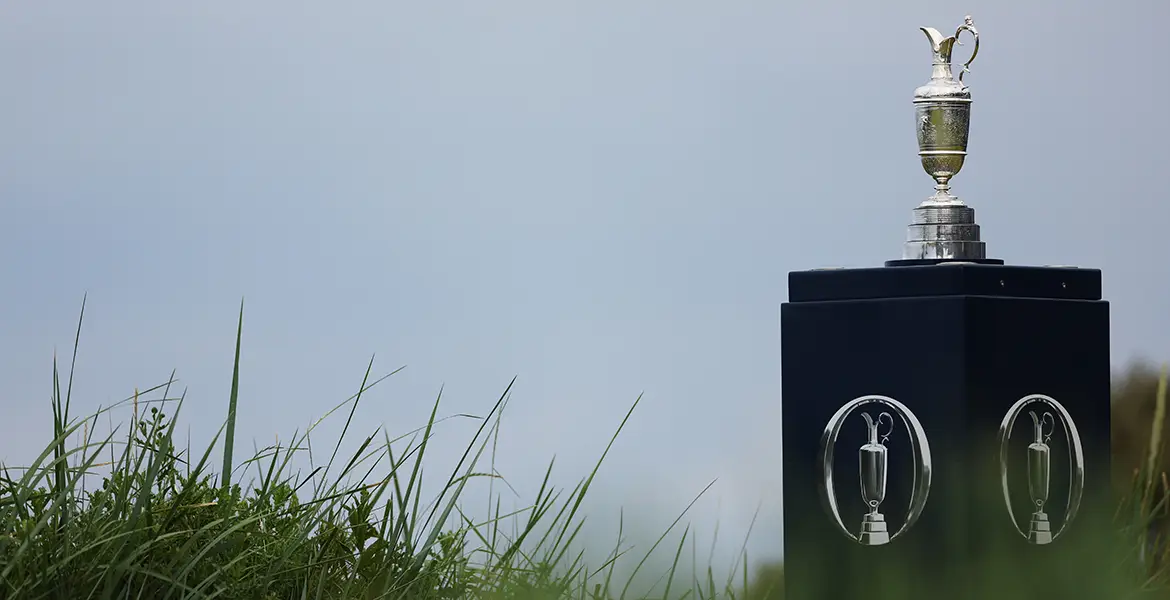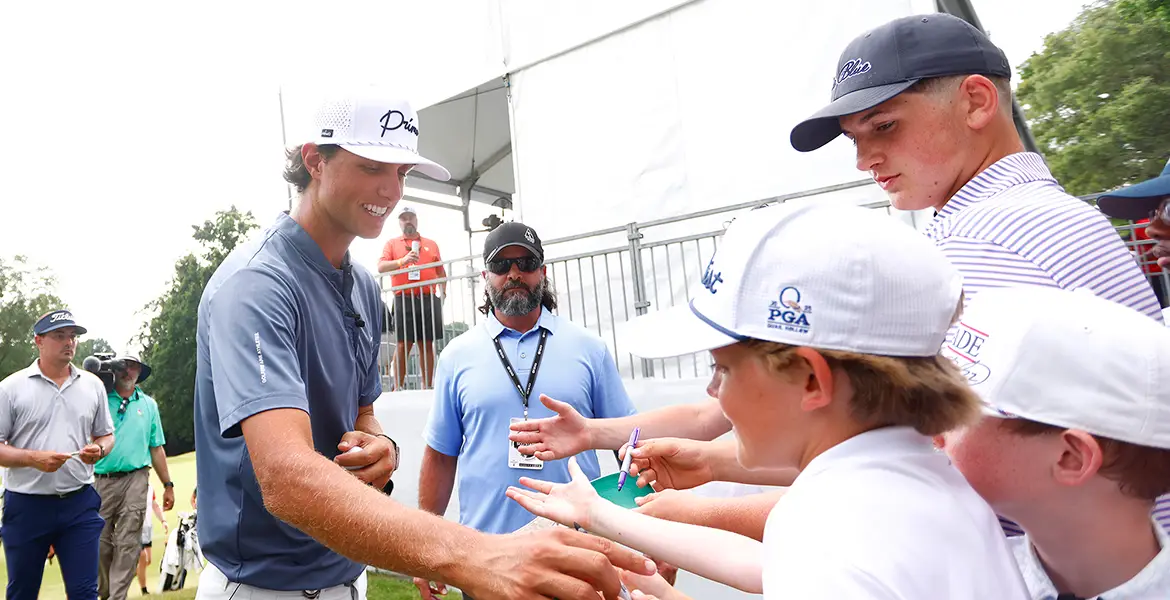Love him or hate him, give Brandel Chamblee credit for knowing what he talks about on television—and a whole lot more
I can’t believe I get to play golf with Brandel Chamblee today,” Donald Trump said as he strode to his regular table at Trump International Golf Club in West Palm Beach, Fla. “You know,” Trump said, “you and I are a lot alike.”
“How’s that?” Chamblee asked.
“We both get in trouble for telling the truth.”

Chamblee laughed and said, “With all due respect, Mr. President, you get a little more controversial than I do.”
Trump shook his head and smiled. “Not in the golf space.”
That last exchange could be carved on golf’s stone tablets. Chamblee, the 61-year-old analyst who, through turnover and turmoil, has become the face of NBC Sports/Golf Channel, embraces his role as provocateur, the man whose opinions and observations are applauded and maligned with equal vigor. And not just among fans. On a rainy afternoon at a long-past Ryder Cup, Chamblee and David Duval, separated on the NBC set by Frank Nobilo, got into the kind of spat that still rouses golf fans out of their slumber.
“A team takes on the personality of its leadership,” Chamblee said in that exchange. “If there is apathetic leadership, there will be apathetic performance. Every single player that was of the caliber of Tiger (Woods) and Phil (Mickelson), going as far back as you want to go, has a winning record in the Ryder Cup. Correspondingly, their teams won. Nick Faldo, winning record, corresponding to his rank in the game. Bernhard Langer, winning record, corresponding to his rank in the game. Arnold Palmer, Jack Nicklaus, Lee Trevino, Tom Watson… The two that do not are Tiger and Phil.”
Back and forth it went until a flustered Duval pulled out the “you never played in one” card, a slap Chamblee gets often. He won once in a 15-year PGA Tour career, the 1998 Greater Vancouver Open by three strokes over Payne Stewart, but he was in the top-100 on the PGA Tour money list seven seasons in a row.
“You think actually having to be out there determines whether or not you can pass judgement on it?” Chamblee asked. “I wasn’t at the Boston Tea Party, but I can tell you all about it.”
Duval snapped, “Okay, well, you’re never wrong, I understand that.”
And that’s when the debate ended. Brandel, as he often does, won.

Despite his critics’ best efforts to paint him otherwise, he’s not a know-it-all. He’s a want-to-know-it-all, a curious and courtly Texan who can shoe a Quarter Horse one minute and bend the lie angle on his wedge the next. He knows that no one will ever gain all the knowledge of the world, but he believes that it’s a sin against God not to try. He does his own research and handwrites his own notes on a legal pad, in part, because, according to him, “That’s how you own the information. That’s how you say something unique.”
There’s never a day when he doesn’t read, and not just emails, texts, or pithy quips on X. Chamblee reads books, meaty and deep, everything from Thomas Sowell and Tom Callahan to The Psychology of Totalitarianism by an obscure Belgian Ph.D. named Mattias Desmet and LIV and Let Die by middle-aged sports-writing hipster Alan Shipnuck.
If you believe social media, he’s the game’s worst human. Forget that he’ll strike up a conversation with just about anybody.
“Where are you from? That accent isn’t Greek but I’m guessing it’s somewhere in the region,” he asked a waitress on the patio at a French restaurant in Florida recently. It turned out she hailed from western Turkey, which sparked another round of questions and answers after the Dijon deviled eggs and before the short rib beef arrived. The man can’t help himself. In a world full of fascinating stories, Chamblee feels an urgency to understand as many of them as possible.
He also reads physical clippings from newspapers and magazines, cut at odd angles with scissors by his father, Harold, who also pencils notes in the corner margins before mailing them to his son in manila envelopes.

By the time you meet Chamblee and wife Bailey (neé Mosier, a former college player at Old Dominion and NBC/Golf Channel alum) for a long-overdue dinner, you aren’t surprised that he knows how many kids the valet has, along with their ages and interests. Before the espresso and dessert arrive, he’ll know the name of the maître d’s wife and how long they’ve been married. And he’ll remember every name, making sure to wish them all well on his way out.
In the interim, the conversation ranges from Douglas Murray’s book The Madness of Crowds to his odd-couple friendship with Eamon Lynch, the Irish writer and co-host of NBC/Golf Channel’s Golf Today. Chamblee leans forward to talk about geopolitics, economic forecasting, and the rise of global antisemitism. Spread in between, like butter on a baguette, he talks about Rory McIlroy’s putting stats and the next college golf superstar.
“My dad was very curious, and I have brothers and sisters who are not in golf but are in everything else from football to politics to religion,” he says. “My mom is very religious and my dad isn’t, so we would debate all those things that you’re told you shouldn’t want to debate. My dad always made it fun, because he would poke everybody. There was a curiosity that was fertile at the house.”
Throughout Brandel’s childhood, Harold—who had a homebuilding business in Irving, Texas—would cook steaks on the weekends while Mrs. Chamblee would invite guests of all stripes to dinner, from priests, lawyers, ranchers, engineers, and oil men to full-blown college-professor communists with perpetual scowls and nests of white hair erupting from their ears. The Chamblee house was always awash with interesting characters and borderline-hostile debates.

Chamblee and his first wife, Karen, have four children: three sons, Brandel Jr., Braeden, and Brennen, and a daughter, Bergin. He goes into great detail about almost everything except the reason that he retired from playing and took up television. That’s because of the tragedy, which he discusses rarely. Braeden was born two months premature and passed away in infancy, a loss so devastating that, unlike “widow” and “orphan,” the English language doesn’t have a word for it. A memorial playground for Braeden sits behind the Phoenix Children’s Hospital. Understandably, Chamblee spent less time on the road after that. He eventually showed up on an ABC broadcast. Not long after, he became an analyst for Golf Channel. He’s a fierce advocate for adoption—Brennen and Bergin are adopted from the same biological mother, born one year apart—and he speaks to his own parents several times a week, calling himself the luckiest man alive to still have them both.
Against that backdrop, nothing in golf seems all that important. Criticism from strangers, especially online, washes away unnoticed.
“Standing on the range talking with John Maginnes, I said ‘You know, golfers used to look like us,’” he says the morning after the final round of The American Express, where he made his booth debut for NBC. That was the week Nick Dunlap became the first amateur to win a PGA Tour event in three decades. “Golfers used to be five-nine like me and if they were five-ten or more, they looked like bowlers,’” Chamblee says. “Nick Dunlap is six-three one-eighty. He looks like an MLB pitcher. Those guys are all so tall and so ripped. Every single person on tour now looks like a long driver. You have to applaud how athletic these guys are.
“But you know, I don’t see the NBA raising the height of the goal and yet everybody dunks,” he says, drifting onto another bed of hot coals. “In the NFL, I don’t see them forcing the receivers to take their gloves off. You could catch a greased watermelon with those gloves, but they allow the guys to use them because those one-handed acrobatic receptions are exciting.

“In golf, it’s fun seeing these fit guys get after it. Go back to the ’80s, there were like two guys who were fit. You had Greg Norman and Keith Clearwater and that was it. Now, there are no Porky Olivers; there are no Billy Caspers; you don’t even have any Tom Kites, guys who are fit but not ripped.
“People want to talk about equipment in golf, and, sure, some of it is that. If we’ve picked up 45 yards, maybe 20 of that is from equipment. But 20 of it is fitness and speed, and about five yards is agronomy. I stand on the range now and I think Ho. Ly. Shit. I can’t believe what I’m seeing here.”
Equipment isn’t the only bull in front of which he’ll wave a red cape. He was an early and harsh critic of LIV and the influence of Saudi Arabia on golf, a topic he not only engages with on X about, but one he also debated with President Trump.
“The President really wanted to know my perspective on LIV, and he shared his perspective, which differed from mine,” Chamblee says. “We debated LIV off and on all day.”
They also talked about Elvis, opera, Taylor Swift, Ernie Els, network news, old golf swings, immigration, and family, especially after Bailey rode out to join them.
The Chamblees are mirror images of each other, 24 years apart. Brandel first saw Bailey when she interned during one of the telecasts. Rich Lerner had a request, and this beautiful young woman jumped right on it with a level of enthusiasm that caught Chamblee by surprise. He saw her again a few weeks later when he was changing his grips at Cool Clubs. A recent graduate with a master’s in communications, Bailey was doing some marketing for the company in addition to editing and writing for Avid Golfer magazine. She asked to interview him for a story.
“We exchanged numbers and I texted her and said, ‘I’m going out with a few friends tomorrow night for drinks and you’re welcome to join us.’”
There were no friends. There were never any friends. When Bailey realized that her eyes widened and she said, “I am not dating you.”

Chamblee told that story at their wedding, an intimate gathering at Arizona Country Club. The password to RSVP was “Maybe…Yes, sir!” the famous Verne Lundquist call from the 1986 Masters.
“We’re just golf geeks,” Chamblee says. “She’s an elegant, old soul, and the kindest person I know.”
She’s also patient, a prerequisite in the Chamblee marriage as the man will get sidetracked.
“So, do you ever travel back to Turkey?” he asked the waitress after paying the bill at the French restaurant.
“Not really,” she said. “Maybe next year.”
“Well, I’m happy you found a home here. Have a great night.”
She stuck out her hand. “You, too.” Then she closed the evening with a question he loves more than any other. “I’m sorry,” she said. “What was your name again?”
Thank you for supporting our journalism. If you prefer to read in print, you can also find this article in the Spring 2024 issue of LINKS Magazine. Click here for more information.







great article !
Brandel Chamblee is the biggest POS in golf!